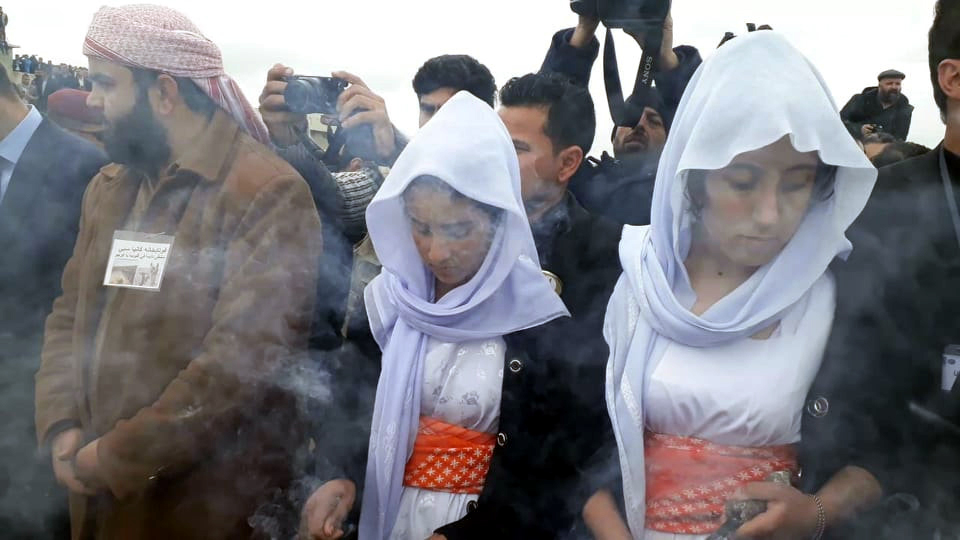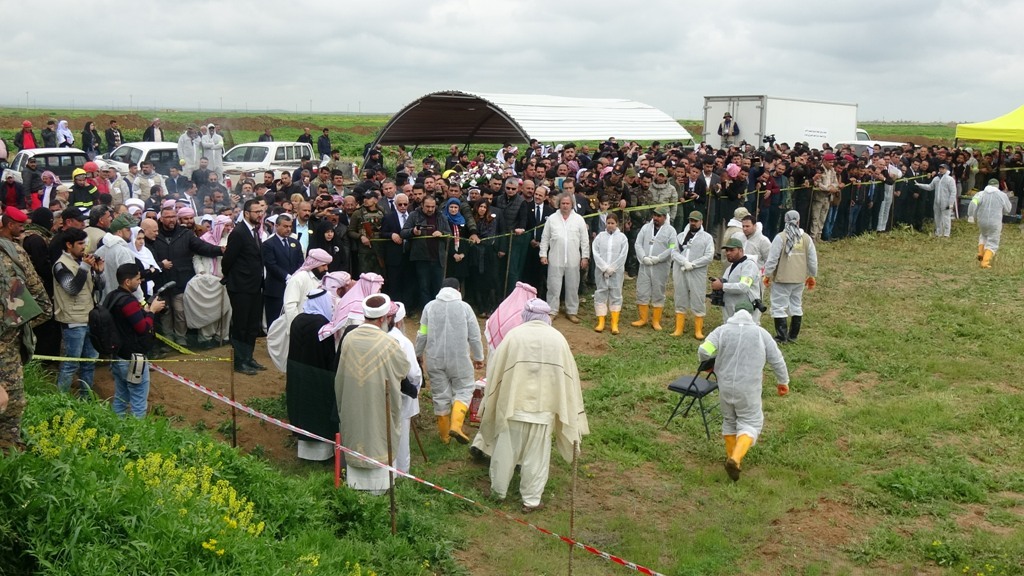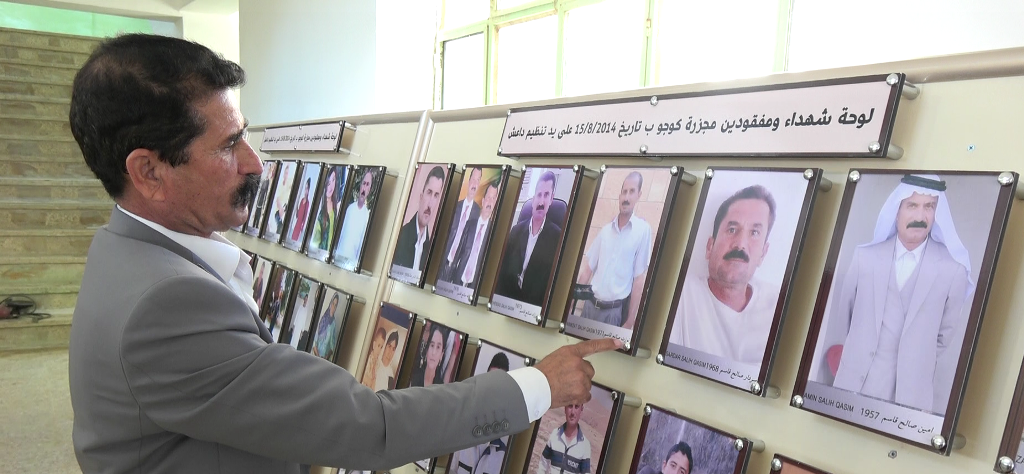Elias Salih stands in front of a large pit and witnesses the shooting of his relatives; With each bullet, his relatives fell into the pit behind him while he and his other relatives awaited the same fate.
Salih, 47, is scared to death. and the second batch of Yazidis will begin in a few minutes. The story began at that time. They separate him from his wife and children. His 15-year-old son insists to stay with his father yet the militants refuse.
The extremist militants of the Islamic State of Iraq and the Levant (ISIL) were able to do whatever they want in the village of Kocho, Shingal district of Ninewa province, except for one thing: they couldn’t weaken the villagers' strong faith in their religion, Ezidism, for a moment.
Shingal, located 120 west of Mosul, on the border of Iraq-Syria, is home to the Ezidi minority targeted by ISIL in August 2014 and one of the disputed territories between Baghdad and Erbil.
Seized in August 2014 by IS militants whom accused the Ezidis of being “heretics,” Shingal has been the scene of tragedy: a genocidal campaign of killings, rape, abductions and enslavement, amounted to genocide lately acknowledged by the United Nations and parliaments of Belgium and Netherlands.
Thousands of Ezidi women, girls and kids were enslaved and taken as sex slaves. KRG office for rescue of missing Ezidis says 6,417 Ezidis were enslaved by IS when it took over Shingal in 2014 and 2,700 of them have been brought to unknown destiny.
First, people to get naked
Elias Salih Qasim was working at his pharmacy in the village of Kocho in Shingal at 10 am on August 15, 2014, when more than 20 vehicles full of IS fighters entered the village with two shovels.
He watched the gunmen as they hurried out of their vehicles and dispersed; A week earlier, the Wali (mayor) of Mosul had ordered the "release" of the Ezidis (Yazidis) from Kocho village.
“I was still in my pharmacy when my 15-year-old son suddenly came in and said, 'Dad, we all have to go to the school, the militants say so,'” Elias recalls.

Elias and his son head to the Kocho school. “When I went, all the people of Kocho were gathered there, children, women, the elderly and my family.”
They gather men on the ground floor of the school and women and children on the first floor.
In the middle of the school, one of the IS leaders called (Abu Hamza) was walking and talking in Arabic to Naif Jaso, the headman of Kocho village.
Elias felt calm when he saw that and thought they would not harm the Ezidis since a week earlier, the Wali of Mosul had told Naif Jaso, "You are free, no harm upon you."
We warned you from the first day to become Muslims, but you did not accept
On the same day at the school, Abu Hamza shouted, "We will release anyone who converts to Islam," but Elias said no one responded, indicating that the request was rejected.
Shortly after Abu Hamza's call, ISIL took mobile phones and money from the people of Kocho, even the women's gold rings and bracelets.
Ezidism is an old Middle Eastern monotheistic ethnic religion and is based on belief in one God who created the world and entrusted it into the care of seven Holy Beings, known as Angels. The outstanding among these angels is Melek Taus who is the leader and has authority over the world.
Most Ezidis speak Kurmanji, one of the two main Kurdish dialects, however, most Ezidis consider Ezidism a religious not ethnic identity.
A village falls behind
In his family, only Elias and his 15-year-old son leave the school together. A Kia cargo vehicle was parked in front of the school and people were forced into the car.
"My son was very scared. He wanted to climb with me and jumped into the car, but they stopped him and separated us.”
According to the fighters, they were allegedly being taken to Mount Shingal – which was then under the control of forces close to the outlawed Kurdistan Workers Party PKK, but about 300 meters from the village, they stop the car and line up in batches near a pit.
“Six Daesh fighters were standing and lined up a group of men at a time and shot them,” Elias said, adding that he saw his relatives fall into the pit on their backs as they were shot in front, while several fighters were taking pictures and recording videos.
Six Daesh fighters stood, lined up a group of men and shot them
“The first batch was over and we were the second batch. We were lined up with others and were shot,” Elias said. He was shot twice in the thigh but his leg was not broken.
He said he pretended to be dead when he fell to the ground. Although the gunmen came at him and fired more shots, he was not hit by any more bullets.
ISIS attacked Shingal on August 3, 2014 and carried out massacres in the Yazidi village of Kocho on August 15; According to the statistics of the General Directorate of Yazidi Affairs in the Ministry of Endowments of the Kurdistan Regional Government, 2,293 Yazidis have been killed by ISIS.
Ezidis are an ethno-religious minority over half a million population, mostly residing in Shingal and Shekhan in northern Iraqi province of Ninewa. Thousands have migrated abroad and tens of thousands are still living under tents in camps for internally displaced persons IDP, in Duhok Northern Province.

Elias escapes
Late that evening, when it went dark, Elias left the scene of the massacre, managed to escape wounded to a nearby farm and then went to Mount Shingal that night.
"I went to Mount Shingal with great difficulty and met several Ezidi families there."
Mount Shingal is located about 23 km north of Kocho village.
The next day, with the help of PKK fighters, Elias was taken to the Syrian city of Derik, where he received treatment.
"I survived, but I lost my family and children," he said as he was looking at the pictures of the victims of Kocho massacre.
In late March, the Iraqi government excavated the first out of 73 mass graves of the Yazidis in Kocho.





